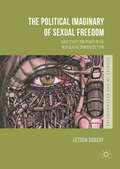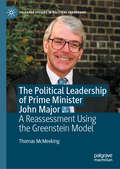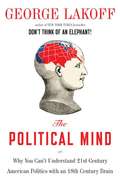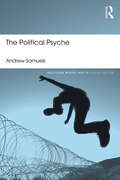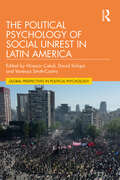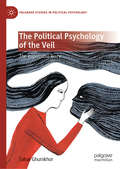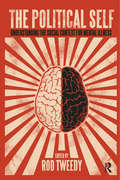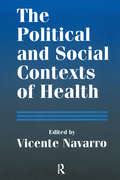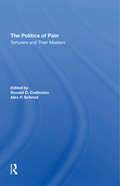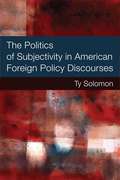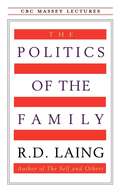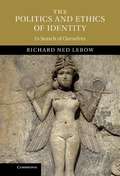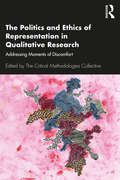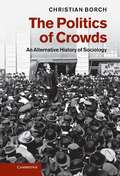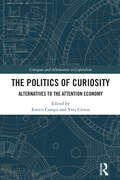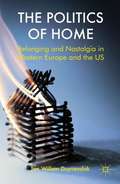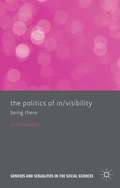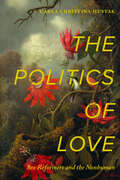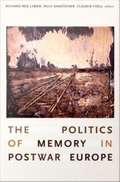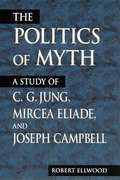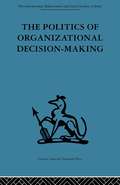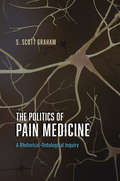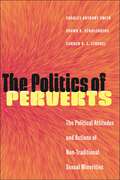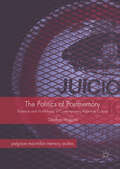- Table View
- List View
The Political Imaginary of Sexual Freedom: Subjectivity and Power in the New Sexual Democratic Turn (Studies in the Psychosocial)
by Leticia SabsayThis book develops a performative and relational approach to gendered and sexualised bodies conceived as distinct from the more limited individualistic idea of sexual identity and orientation that is at play within notions of progress in contemporary transnational sexual politics. Focusing on the psychosocial dimension of sexual life, Sabsay challenges accepted ideas of increased emancipation, and the steady extension of rights, offering instead a critique of the liberal imaginary that is at the base of the sexual rights-bearing subject. The book offers a notion of sexual embodiment that provides an alternative to individualism, one that is social, radically relational and psychically divided, and that implies a different conception of democratic sexual politics for our time.This book brings together political and cultural analysis of sexual rights discourse with a strong theory of the relational subject whose political investments and articulations depend on a political imaginary. This is a highly original and methodical text which will be of particular interest to academics and scholars of gender and sexuality studies, sociology, politics and psychology.
The Political Leadership of Prime Minister John Major: A Reassessment Using the Greenstein Model (Palgrave Studies in Political Leadership)
by Thomas McMeekingThis book seeks to re-examine John Major’s leadership using techniques developed through Presidential Studies: namely using Fred Greenstein’s seminal study of Presidential Leadership, The Presidential Difference, and its six criteria for leadership (public communicator, organisational capacity, political skill, public policy vision, cognitive style, and, finally, emotional intelligence). It is through Greenstein’s model that a fresh look can be taken at not only Major’s time in office, but equally the man himself, which proves to be just as revealing. Major’s tenure has often been characterised as being weak and incompetent, as he presided over a sleaze-ridden and divided party on the issue of Europe. With almost a quarter of a century having passed since Major left office, it looks to be an appropriate moment to re-assess his premiership and important role in the recent seismic events surrounding the 2016 Brexit referendum and its outcome.
The Political Mind: Why You Can't Understand 21st-Century Politics with an 18th-Century Brain
by George LakoffIn What's the Matter with Kansas?, Thomas Frank pointed out that a great number of Americans actually vote against their own interests. In The Political Mind, George Lakoff explains why. As it turns out, human beings are not the rational creatures we've so long imagined ourselves to be. Ideas, morals, and values do not exist somewhere outside the body, ready to be examined and put to use. Instead, they exist quite literally inside the brain-and they take physical shape there. For example, we form particular kinds of narratives in our minds just like we form specific muscle memories such as typing or dancing, and then we fit new information into those narratives. Getting that information out of one narrative type and into another-or building a whole new narrative altogether-can be as hard as learning to play the banjo. Changing your mind isn't likechanging your body-it's the same thing. But as long as progressive politicians and activists persist in believing that people use an objective system of reasoning to decide on their politics, the Democrats will continue to lose elections. They must wrest control of the terms of the debate from their opponents rather than accepting their frame and trying to argue within it. This passionate, erudite, and groundbreaking book will appeal to readers of Steven Pinker and Thomas Frank. It is a fascinating read for anyone interested in how the mind works, how society works, and how they work together.
The Political Psyche (Routledge Mental Health Classic Editions)
by Andrew SamuelsWhat can depth psychology and politics offer each other? In The Political Psyche Andrew Samuels shows how the inner journey of analysis and psychotherapy and the passionate political convictions of the outer world are linked. He brings an acute psychological perspective to bear on public themes such as the market economy, environmentalism, nationalism, and anti-Semitism. But, true to his aim of setting in motion a two-way process between depth psychology and politics, he also lays bare the hidden politics of the father, the male body, and of men's issues generally. A special feature of the book is an international survey into what analysts and psychotherapists do when their patients/clients bring overtly political material into the clinical setting. The results, including what the respondents reveal about their own political attitudes, destabilize any preconceived notions about the political sensitivity of analysis and psychotherapy. This Classic Edition of the book includes a new introduction by Andrew Samuels.
The Political Psychology of Social Unrest in Latin America (Global Perspectives in Political Psychology)
by Hüseyin ÇakalThe Political Psychology of Social Unrest in Latin America is a unique collection of research and writings by Latin American scholars. It explores the social, psychological, and political factors of the recent turmoil in Latin American countries.From the ongoing political crisis in Venezuela, the impeachment demonstrations in Brazil, student movements in Chile, and massive demonstrations in Chile, Peru, Colombia, Ecuador, Bolivia, Venezuela, and Nicaragua, this edited volume analyses the underlying similarities and differences between these events through the lens of diverse research traditions, methods, and researchers. The book examines both actual inequalities and disadvantages as well as the role of perceptions of inequality and injustice. The authors also investigate the role of micro-processes, such as cultural consumption in the family, and the role of social psychological processes in historical Latin American unrest. By utilising leading approaches in social and political psychology and testing these approaches in the context of a very diverse and dynamic non-WEIRD (Western, Educated, Industrialized, Rich, and Democratic) societies, the authors bring the communities and civilizations less studied by Western social psychologists to the international audience.Focusing on how social and political processes unfold in different countries and providing insights into the psychological underpinnings of social unrest from a variety of perspectives, this is an essential reading for students and researchers of psychology, social, political, peace and cross-cultural psychology as well as political science and sociology.
The Political Psychology of the Veil: The Impossible Body (Palgrave Studies in Political Psychology)
by Sahar GhumkhorVeiled women in the West appear menacing. Their visible invisibility is a cause of obsession. What is beneath the veil more than a woman? This book investigates the preoccupation with the veiled body through the imaging and imagining of Muslim women. It examines the relationship between the body and knowledge through the politics of freedom as grounded in a ‘natural’ body, in the index of flesh. The impulse to unveil is more than a desire to free the Muslim woman. What lies at the heart of the fantasy of saving the Muslim woman is the West’s desire to save itself. The preoccupation with the veiled woman is a defense that preserves neither the object of orientalism nor the difference embodied in women’s bodies, but inversely, insists on the corporeal boundaries of the West’s mode of knowing and truth-making. The book contends that the imagination of unveiling restores the West’s sense of its own power and enables it to intrude where it is ‘other’ – thus making it the centre and the agent by promising universal freedom, all the while stifling the question of what freedom is.
The Political Self: Understanding the Social Context for Mental Illness
by Rod TweedyThis book explores how our social and economic contexts profoundly affect our mental health and wellbeing, and how modern neuroscientific and psychodynamic research can both contribute to and enrich our understanding of these wider discussions. It therefore looks both inside and outside - indeed one of the main themes of The Political Self is that the conceptually discrete categories of 'inner' and 'outer' in reality constantly interact, shape, and inform each other. Severing these two worlds, it suggests, has led both to a devitalised and dissociated form of politics, and to a disengaged and disempowering form of therapy and analysis.
The Political and Social Contexts of Health: Politics of Sex in Medicine
by Vicente NavarroThis analysis of the political and social forces that shape the well-being and quality of life of populations in developed capitalist countries is written by scholars based in several different countries. The book shows how the varying political traditions in the developed world - social democratic, Christian democratic, conservative, and liberal traditions - have affected populations' health and quality of life in the western democracies. The contributors also analyze the public and social policies derived from each of these political traditions that have affected levels of social inequality (through changes in the welfare states and labor markets) and on health and quality of life.
The Politics Of Pain: Torturers And Their Masters
by Ronald D Crelinsten Alex SchmidAlthough a wave of democratization appears to be sweeping the globe, torture persists in more than seventy-five nations. Despite widespread condemnation of torture and the efforts of international and nongovernmental organizations to end it, the "politics of pain" continues in a broad range of social and political systems. This book is one of the first to systematically examine the psychological, cultural, and social origins of torture. It provides profiles of torturers and of those who direct them in their brutal activities. The contributors provide case studies from the past and present, including Somoza's National Guard in Nicaragua and regimes in the Southern Cone of Latin America and in Greece.
The Politics Of Subjectivity In American Foreign Policy Discourses
by Ty SolomonWhy are some discourses more politically efficacious than others? Seeking answers to this question, Ty Solomon develops a new theoretical approach to the study of affect, identity, and discourse--core phenomena whose mutual interweaving have yet to be fully analyzed in International Relations. Drawing upon Jacques Lacan's psychoanalytic theory and Ernesto Laclau's approach to hegemonic politics, Solomon argues that prevailing discourses offer subtle but powerfully appealing opportunities for affective investment on the part of audiences. Through empirical case studies of the affective resonances of the war on terror and the rise and fall of neoconservative influence in American foreign policy, Solomon offers a unique way to think about the politics of identity as the construction of "common sense" powerfully underpinned by affective investments. He provides both a fuller understanding of the emotional appeal of political rhetoric in general and, specifically, a provocative explanation of the reasons for the reception of particular U. S. foreign policy rhetoric that shifted Americans' attitudes toward neoconservative foreign policy in the 1990s and shaped the post-9/11 "war on terror. "
The Politics Of The Family (CBC Massey Lectures)
by R. D. Laing<P><P>Using concepts of schizophrenia, R.D. Laing demonstrates that we tend to invalidate the subjective and experiential and accept the proper societal view of what should occur within the family. <P><P> A psychoanalyst and psychiatrist, Laing worked at the Tavistock Institute of Human Relations. His books include The Self and Others and The Politics of Experience.
The Politics and Ethics of Identity
by Richard Ned LebowWe are multiple, fragmented, and changing selves who, nevertheless, believe we have unique and consistent identities. What accounts for this illusion? Why has the problem of identity become so central in post-war scholarship, fiction, and the media? Following Hegel, Richard Ned Lebow contends that the defining psychological feature of modernity is the tension between our reflexive and social selves. To address this problem Westerners have developed four generic strategies of identity construction that are associated with four distinct political orientations. Lebow develops his arguments through comparative analysis of ancient and modern literary, philosophical, religious, and musical texts. He asks how we might come to terms with the fragmented and illusionary nature of our identities and explores some political and ethical implications of doing so.
The Politics and Ethics of Representation in Qualitative Research: Addressing Moments of Discomfort
by The Critical Methodologies CollectiveThis book offers insights on politics and ethics of representation that are relevant to researchers concerned with struggles for justice. It takes moments of discomfort in the qualitative research process as important sites of knowledge for exploring representational practices in critical research. The Politics and Ethics of Representation in Qualitative Research draws on experiences from research processes in nine PhD projects. In some chapters, ethical and political dilemmas related to representational practices are analyzed as experienced in fieldwork. In others, the focus is on the production of representation at the stage of writing. The book deals with questions such as: What does it mean to write about the lives of others? How are ethics and politics of representation intertwined, and how are they distinct? How are politics of representation linked to a practice of solidarity in research? What are the im/possibilities of hope and care in research? Drawing on grounded empirical research, the book offers input to students, PhDs, researchers, practitioners, activists and others dealing with methodological dilemmas from a critical perspective. Instead of ignoring discomforts, or describing them as solved, we stay with them, showing how such a reflective process provides new, ongoing insights.
The Politics of Collective Violence
by Charles TillyAre there any commonalities between such phenomena as soccer hooliganism, sabotage by peasants of landlords' property, incidents of road rage, and even the events of September 11? With striking historical scope and command of the literature of many disciplines, this book seeks the common causes of these events in collective violence. In collective violence, social interaction immediately inflicts physical damage, involves at least two perpetrators of damage, and results in part from coordination among the persons who perform the damaging acts. Professor Tilly argues that collective violence is complicated, changeable, and unpredictable in some regards, yet that it also results from similar causes variously combined in different times and places. Pinpointing the causes, combinations, and settings helps to explain collective violence and its variations, and also helps to identify the best ways to mitigate violence and create democracies with a minimum of damage to persons and property.
The Politics of Crowds
by Christian BorchWhen sociology emerged as a discipline in the late nineteenth century, the problem of crowds constituted one of its key concerns. It was argued that crowds shook the foundations of society and led individuals into all sorts of irrational behaviour. Yet crowds were not just something to be fought in the street, they also formed a battleground over how sociology should be demarcated from related disciplines, most notably psychology. In The Politics of Crowds, Christian Borch traces sociological debates on crowds and masses from the birth of sociology until today, with a particular focus on the developments in France, Germany and the USA. The book is a refreshing alternative history of sociology and modern society, observed through society's other, the crowd. Borch shows that the problem of crowds is not just of historical interest: even today the politics of sociology is intertwined with the politics of crowds.
The Politics of Curiosity: Alternatives to the Attention Economy (ISSN)
by Yves Citton Enrico CampoThrough a variety of studies in the emerging field of attentional studies, this book examines and seeks alternatives to the current attention economy. Bringing together the work of leading scholars of ‘critical attention studies’ to reflect on issues such as techno-politics, socio-politics, and the politics of distraction, it offers a new and multi-disciplinary conceptualization of attention that emphasizes the connections between attention and curiosity, distraction, decoloniality and care. Above all, The Politics of Curiosity asks us to consider the nature and ambivalence of the curious forms of politics that might be taking shape in the shadow of our current attention economy.The “attention economy” has become a household name: we all know our attention is being harvested, commodified and packaged to be sold to advertisers by capitalist platforms. We all complain about it; some of us dream of disconnection; others call to fight back. By focusing on attentional deficits, and by reducing attention to being focused, however, the common view may miss wider stakes, and more promising opportunities. This collective volume provides a new frame of analysis based on three displacements. First, it relocates attentional issues within a triangulation that explores a continuum between attention, distraction and curiosity. Second, it invites us to investigate into the mental infrastructures that socially condition our perceptions and understandings of the world. Third, it points towards emancipatory politics of curiosity to provide alternatives to the attention economy. Contributions range from pedagogy to media theory, via digital studies, epistemology, sociology, political philosophy, literary history, aesthetics, film and dance studies. They gather some of the leading scholars who shaped the study of attention, questioned the values of distraction and explored the potentials of curiosity over the recent years. They extend across nine countries, four continents and seven languages, to provide a multicultural approach to these debates. Together, they help us understand how our current mental infrastructures have taken shape, under specific regimes of power and authority, in a world dominated by capital, colonialism and patriarchy. But they also sketch what can be done to redeploy them around imperatives of respect and care – from a better awareness of our mental biases, online behaviors and bodily movements, to our collective capacity to restructure classroom interactions, to launch alternative digital platforms, to build democratic movements.The first platform for discussion of the politics of attention and curiosity – and an essential point of reference for future debate – this book will appeal to scholars of sociology, politics and psychology.
The Politics of Home
by Jan Willem DuyvendakThis book examines ideas of 'home' of Americans and Western Europeans under the influence of the two major revolutions of our times: the gender revolution and increased mobility due to globalization. It analyzes how 'home' has been politicized, as well as alternative home-making strategies that aim to transcend the 'logic of identities'.
The Politics of In/Visibility: Being There (Genders and Sexualities in the Social Sciences)
by Kath WoodwardThe Politics of In/Visibility.
The Politics of Love: Sex Reformers and the Nonhuman
by Carla Christina HustakThe Politics of Love explores the entanglement of emotions, social movements, and science in reconfiguring human and nonhuman relations. As Darwin's evolutionary theory informed the development of sexual science and the sex reform movement between the 1890s and the 1920s, sex reformers emerged as a group of diverse and culturally influential professionals—doctors, psychologists, artists, political activists, novelists, and academics—who shared a profound commitment to changing the world by changing the practice of sex. Sex reformers reinvented love as a scientific practice of sex that brought humans and nonhumans into the fold of early-twentieth-century racial, gender, and sexual politics. Carla Christina Hustak illuminates how sex reformers' insistence that love can shift human and nonhuman relations is more than just a historical narrative—it is a moment in time interconnected with urgent contemporary concerns over the global implications of our emotional relationships to other humans, animals, the earth, and atmospheric and technological forces.
The Politics of Memory in Postwar Europe
by Richard Ned Lebow Wulf Kansteiner Claudio FoguFor sixty years, different groups in Europe have put forth interpretations of World War II and their respective countries' roles in it consistent with their own political and psychological needs. The conflict over the past has played out in diverse arenas, including film, memoirs, court cases, and textbooks. It has had profound implications for democratization and relations between neighboring countries. This collection provides a comparative case study of how memories of World War II have been constructed and revised in seven European nations: France, Germany, Austria, Switzerland, Poland, Italy, and the USSR (Russia). The contributors include scholars of history, literature, political science, psychology, and sociology. Country by country, they bring to the fore the specifics of each nation's postwar memories in essays commissioned especially for this volume. The use of similar analytical categories facilitates comparisons. An extensive introduction contains reflections on the significance of Europeans' memories of World War II and a conclusion provides an analysis of the implications of the contributors' findings for memory studies. These two pieces tease out some of the findings common to all seven countries: for instance, in each nation, the decade and a half between the late 1960s and the mid-1980s was the period of most profound change in the politics of memory. At the same time, the contributors demonstrate that Europeans understand World War II primarily through national frames of reference, which are surprisingly varied. Memories of the war have important ramifications for the democratization of Central and Eastern Europe and the consolidation of the European Union. This volume clarifies how those memories are formed and institutionalized. Contributors. Claudio Fogu, Richard J. Golsan, Wulf Kansteiner, Richard Ned Lebow, Regula Ludi, Annamaria Orla-Bukowska, Heidemarie Uhl, Thomas C. Wolfe
The Politics of Myth: A Study of C. G. Jung, Mircea Eliade, and Joseph Campbell
by Robert EllwoodEllwood (Religion, U. of Southern California) delves into the political views implicit in the mythological theories of probably the three best-known popularizers of myth in the 20th century. He points that all three emerged from the anti-modern pessimism and romanticism that also generated European fascism, and have all been accused of holding fascists and anti-Semitic sentiments. He assesses those charges in light of their entire career and lifetime contribution.
The Politics of Organizational Decision-Making
by Andrew M. PettigrewTavistock Press was established as a co-operative venture between the Tavistock Institute and Routledge & Kegan Paul (RKP) in the 1950s to produce a series of major contributions across the social sciences. This volume is part of a 2001 reissue of a selection of those important works which have since gone out of print, or are difficult to locate. Published by Routledge, 112 volumes in total are being brought together under the name The International Behavioural and Social Sciences Library: Classics from the Tavistock Press. Reproduced here in facsimile, this volume was originally published in 1973 and is available individually. The collection is also available in a number of themed mini-sets of between 5 and 13 volumes, or as a complete collection.
The Politics of Pain Medicine: A Rhetorical-Ontological Inquiry
by S. Scott GrahamChronic pain is a medical mystery, debilitating to patients and a source of frustration for practitioners. It often eludes both cause and cure and serves as a reminder of how much further we have to go in unlocking the secrets of the body. A new field of pain medicine has evolved from this landscape, one that intersects with dozens of disciplines and subspecialties ranging from psychology and physiology to anesthesia and chiropractic medicine. Over the past three decades, researchers, policy makers, and practitioners have struggled to define this complex and often contentious field as they work to establish standards while navigating some of the most challenging philosophical issues of Western science. In The Politics of Pain Medicine: A Rhetorical-Ontological Inquiry, S. Scott Graham offers a rich and detailed exploration of the medical rhetoric surrounding pain medicine. Graham chronicles the work of interdisciplinary pain management specialists to found a new science of pain and a new approach to pain medicine grounded in a more comprehensive biospychosocial model. His insightful analysis demonstrates how these materials ultimately shape the healthcare community's understanding of what pain medicine is, how the medicine should be practiced and regulated, and how practitioner-patient relationships are best managed. It is a fascinating, novel examination of one of the most vexing issues in contemporary medicine.
The Politics of Perverts: The Political Attitudes and Actions of Non-Traditional Sexual Minorities (LGBTQ Politics)
by Charles Anthony Smith Shawn R. Schulenberg Connor B. StrobelReveals the underexplored politics and activism of non-traditional sexual minoritiesOver the past four decades, there has been significant research focused on the political and social lives of lesbian, gay, and transgender (LGT) individuals, exploring how these sexual communities interact with politicians and voters who identify as straight. However, due to society’s binary view of sexuality, this research has overlooked non-traditional sexual minorities.To address this omission, The Politics of Perverts delves into the political attitudes and activities of individuals who identify with non-traditional sexual orientations and practices, such as Polyamory, BDSM, the Furry Fandom, Nudism, and the large bisexual population within these communities. These groups face similar discrimination, stigma, and lack of legal protections in various aspects of life.The authors shed light on the political identities, affiliations, and attitudes of these communities in theUnited States, revealing how sexuality and politics are even more deeply intertwined at the margins of society. Despite facing challenges, these communities actively engage in political discussions and activities in hopes of fostering greater inclusivity, better representation, and more informed policies.
The Politics of Postmemory
by Geoffrey MaguireThis volume examines recent examples of Argentine literature, film, theatre and visual art from the children of the disappeared. By exploring their creative narration of childhood memories and the controversial use of parody, humour and fantasy, Maguire considers how this post-dictatorship generation are increasingly looking towards the past in order to disrupt the politics of the present. More broadly, this interdisciplinary study also scrutinizes the relevance of postmemory in a Latin American context, arguing that the politics of local Argentine memory practices must be taken actively into account if such a theoretical framework is to remain a productive and appropriate analytical lens. The Politics of Postmemory thus engages critically with theories of cultural memory in the Argentine, Latin American and global contexts, resulting in a timely and innovative text that will be of significant interest to students and scholars in the fields of, among others, cultural studie s, film studies, critical theory and trauma studies.
